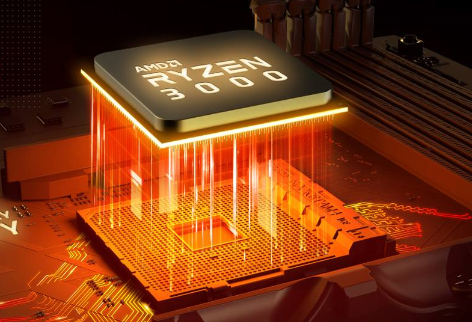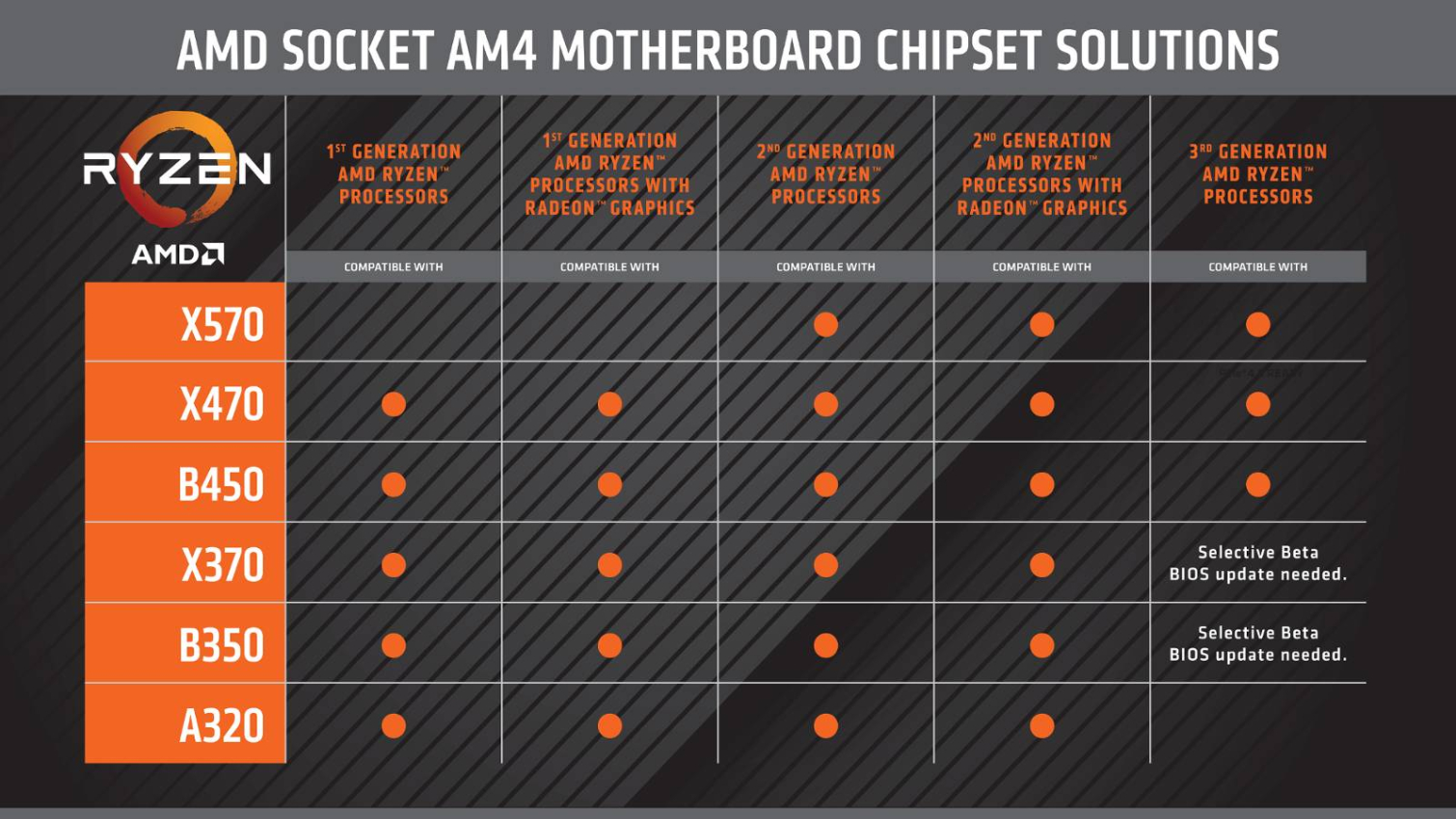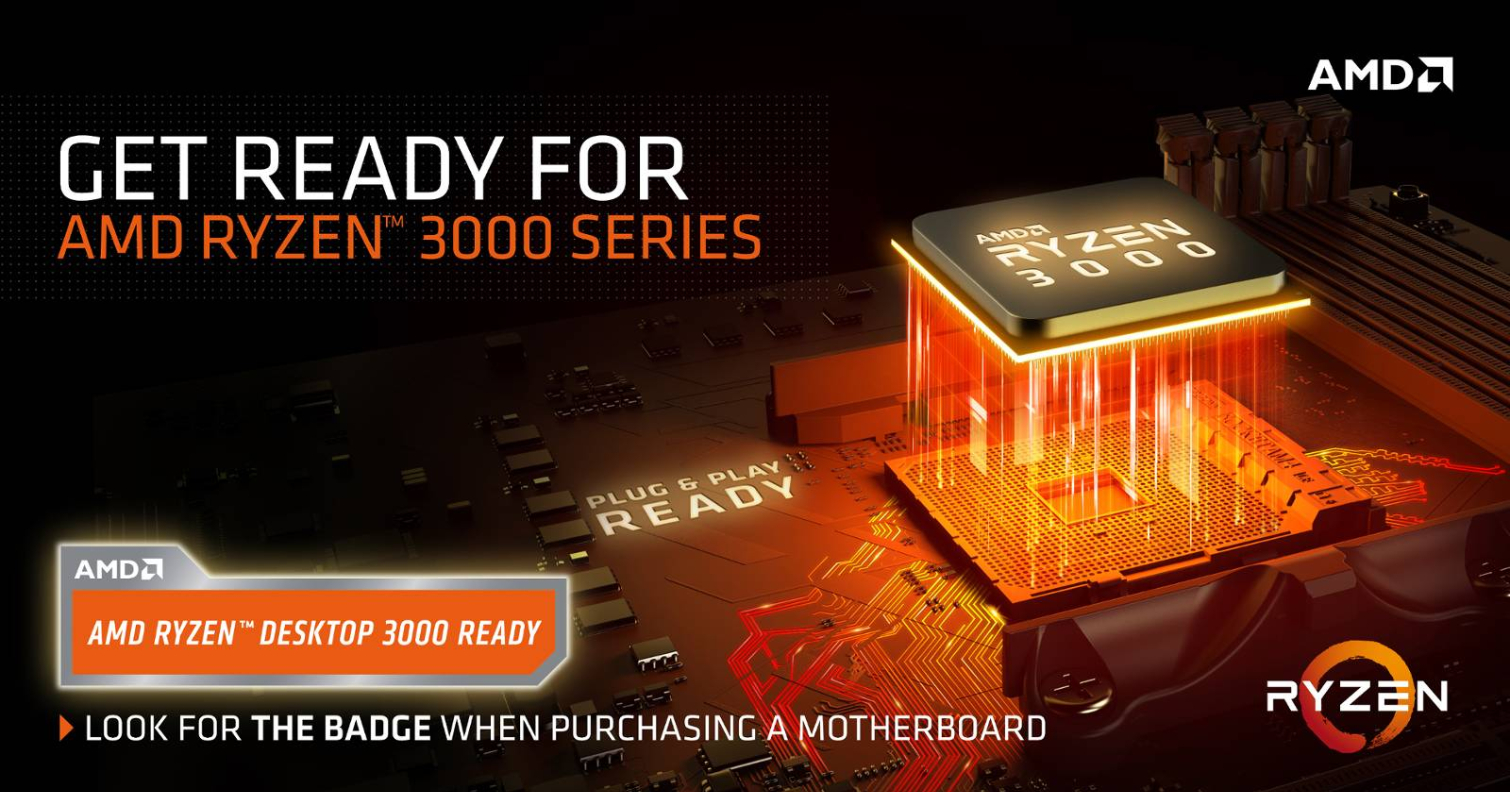Third-Gen Ryzen Not Fully Backward Compatible, X570 Chipset Doesn't Support First-Gen Models, AMD Explains
AMD's Socket AM4 compatibility matrix just got very confusing. During the launch of the first-gen Ryzen processors, AMD delighted enthusiasts with its promise to support all of its Ryzen processors on AM4 Socket motherboards until 2020, but the company is encountering some difficulties delivering on that goal: The new X570 chipset doesn't support the first-gen Ryzen models, and motherboard vendors are steadily dropping support for older processors on existing Socket AM4 motherboards, too. We spoke with AMD and learned that the supported processor list could even vary depending on your motherboard or vendor.
First and foremost, X570 motherboards will not support any of the first-gen Summit Ridge or Raven Ridge processors, so enthusiasts with first-gen Ryzen chips won't be able to step up to the latest and greatest motherboards. Meanwhile, X470 and B450 chipsets will support all generations of Ryzen processors.
But you won't be able to drop a new Third-gen Ryzen chip into all X370 and B350 motherboards, and A320's upgrade path is blocked entirely.
We had the opportunity to sit down with AMD CEO Lisa Su and her team after her Computex 2019 keynote and ask why the new Ryzen processors aren't supported on some of the older motherboards. AMD's Senior Technical Marketing Manager Robert Hallock fielded our question, explaining, "If we look across the ecosystem of motherboards that exist today, we certainly make BIOS updates available to our ecosystem partners to include that on different levels of motherboards in their portfolio, but I don't expect that every motherboard will be updated for 3000 Series processors from our partners. That really will be a portfolio decision from their standpoint as well, as to where they apply those updates, and where they choose not to apply those updates."
Due to the uneven application of BIOS updates across the various vendors, and even among different motherboards in the respective product stacks, you'll have to check the CPU support list for your X370 or B350 motherboard to ensure it supports Third-gen Ryzen.
The problem with backward compatibility boils down to BIOS chip capacity limitations, with AMD's portfolio of Ryzen processors swelling to the point that most BIOS chips do not have enough capacity to store all the microcode and memory training tables for all of the processors.
AMD's goal to support all Ryzen processors on Socket AM4 motherboards until 2020 was audacious, but one the company is proud of, "No one in the history of x86 has created an upgradeable socket quite like AM4. In a time where our competitor is breaking socket compatibility yearly, basically, we have three consecutive generations that all drop into the same socket, and that socket started with four cores years ago, and is now twelve cores, twenty-four threads and PCIe 4.0," said Hallock.
Get Tom's Hardware's best news and in-depth reviews, straight to your inbox.
Finally, there are plenty of X470 and B450 motherboards still on the market, but some of the boards that have been in the supply chain for a while will need a BIOS update before you install a Third-gen Ryzen processor. As we've seen in the past, that isn't always possible if you don't already have a Ryzen processor or if the motherboard doesn't have an out-of-band BIOS update feature, like BIOS Flashback. AMD also announced that all motherboards that support Ryzen 3000 processors out of the box will come with a new badge to help simplify things.

Paul Alcorn is the Editor-in-Chief for Tom's Hardware US. He also writes news and reviews on CPUs, storage, and enterprise hardware.
-
drivinfast247 Well, I doubt many people would buy a $300 motherboard to put a sub $100 CPU in it. Especially when that CPU cannot take advantage of any of the features of said motherboard.Reply -
setx Well, I don't think anyone knowledgeable expected perfect forward compatibility from motherboard vendors. (Just look at the state of microcode updates for older Intel CPUs.)Reply
There are probably real issues preventing compatibility in said places. (Unlike Intel scam with z170/z270/z370 chipsets.) -
salgado18 Based on this, could they have removed 1st gen support to leave space for 4th gen? Since some B350 and X370 can support three gens, maybe it's forward thinking into next generation.Reply
Also could mean A520 in the future. -
mdd1963 At least 4 people in the USA are possibly upset that their $49 Ryzen 3-1200 will not drop into the latest $400 X570 board!Reply -
Ncogneto This is such a non-issue I can't believe Tom's keeps bringing it up. The answer is clear, Bios size limitations only prevent so much data. anyone that wants to drop a Ryzen 3000 into a A320 chipset need to serious recconsider life in general. And who is going to but a 570 MB and then drop in a raven ridge processor?Reply -
King Dranzer Reply
It is not the matter of it being hard to add. It is simply useless for AMD to add that additional feature. Two reasons one they don't want person who is spending on X570 board to settle for comparatively low performing 1st gen CPU. Second is that they already stopped producing 1st gen Ryzen it doesn't makes sense to add support to new gen board for hardware that they are no more producing.TechyInAZ said:AMD, really? How hard is it to add a 1st gen Ryzen support to a motherboard?
If one has to argue that what if a person is upgrading his PC from Gen1 ryzen to gen3 ryzen it is expected to get both CPU and Motherboard upgraded. If budget is not allowing at-least upgrade CPU first and then jump the motherboard. If not all many X370 and B350 boards will be supporting Ryzen gen3 CPUs. -
alextheblue ReplyTechyInAZ said:AMD, really? How hard is it to add a 1st gen Ryzen support to a motherboard?
Most of this is on mainboard OEMs. AMD hands them the microcode, what happens next is up to them. They're in the business of selling motherboards. If you've got an old first-gen board that's no longer being sold, good luck - if it's a high end board it might get support. 400 series boards are still on the market, so they'll get support almost universally. In the case of A320, even IF a motherboard manufacturer was interested in adding support, a lot of those boards would still have limitations (some would be 65W and under only, virtually all would only support fairly slow RAM, no overclocking, poor overall performance, etc).King Dranzer said:It is not the matter of it being hard to add. It is simply useless for AMD to add that additional feature.
That doesn't even address the BIOS chip size limitations. One thing AMD probably should do is set a minimum standard there when they introduce AM5. -
mitch074 ReplyTechyInAZ said:AMD, really? How hard is it to add a 1st gen Ryzen support to a motherboard?
Sockets became much more annoying when the memory controller got embedded in the CPU - because while older motherboard BIOSes only had to deal with connecting a single MC with several memory types, now they have to connect several CPUs with several memory types - complexity shot up.alextheblue said:Most of this is on mainboard OEMs. AMD hands them the microcode, what happens next is up to them. They're in the business of selling motherboards. If you've got an old first-gen board that's no longer being sold, good luck - if it's a high end board it might get support. 400 series boards are still on the market, so they'll get support almost universally. In the case of A320, even IF a motherboard manufacturer was interested in adding support, a lot of those boards would still have limitations (some would be 65W and under only, virtually all would only support fairly slow RAM, no overclocking, poor overall performance, etc).
That doesn't even address the BIOS chip size limitations. One thing AMD probably should do is set a minimum standard there when they introduce AM5.


